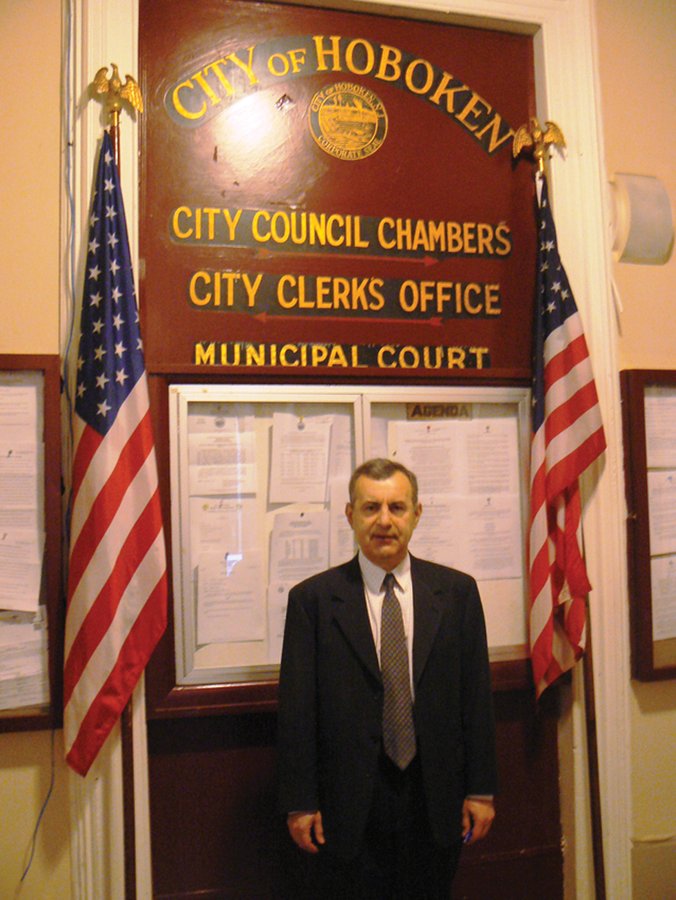Amidst the routine matters that come before the Hoboken municipal court, a constitutionality question is brewing over whether a local man should be punished criminally for refusing to provide a Port Authority police officer with his country of origin.
Vesselin Dittrich, 64, of Hoboken, said he was involved in a conversation in the PATH station in August 2010 with a woman who yelled at him for supposedly looking at her tattoos. The woman summoned a police officer, who told the two to disperse. Dittrich says that the officer said there would be no charges, but asked to take down Dittrich’s information anyway.
Dittrich said he provided information from his driver’s license, but when the officer asked what country he was from, he declined to answer, believing it to be irrelevant and unconstitutional. He says the officer issued him a disorderly conduct ticket for “refusing to provide pedigree information.”
The case is due back in municipal court on Dec. 13.
____________
Most people who receive a ticket in Hoboken simply either mail in their fine or appear in front of the municipal court judge and are finished within a month. But Dittrich, a Bulgarian native and American citizen, is still fighting his case, which is set to go to trial in December.
Dittrich is representing himself.
Problems in court
This past Tuesday morning in Hoboken court, after a series of defendants in other cases pleaded guilty for charges such as drinking in public or talking on a cell phone while driving, Dittrich was called to the stand for his trial.
The stack of paperwork in front of the judge was much higher than any other case in court that day. Over a year of Dittrich fighting in the local legal system was about to come to an end.
However, since Dittrich had filed a pre-trial appeal, the judge adjourned the trial until December to give all the parties time to prepare. The pre-trial appeal was merely a protest of the way the case was being handled and was not meant to delay the case any longer. However, the judge hadn’t had time to read the appeal.
In the past, Dittrich faced choices that were unacceptable to him. According to court transcripts from Oct. 13, 2010, the municipal prosecutor offered to downgrade the charge to a municipal ordinance violation if Dittrich pleaded guilty, but the defendant declined, believing the charges should be dismissed.
After Dittrich failed to accept a fine and guilty plea on that date, Hoboken Municipal Prosecutor Ron Venturi told the judge that “if [the court] goes forward and [Dittrich] is convicted I will be requesting of the court that he be incarcerated for a short period of time,” according to court transcripts.
Dittrich faced the option of admitting guilt and paying a small fine or heading to trial and facing possible incarceration. Yet Dittrich chose to continue to fight, believing he was wrongfully accused.
He plans to appeal if he is convicted.
Dittrich said the multiple, unexpected adjournments of the trial by the judge have caused him to miss at least 10 days of work. He works as a translator in Manhattan.
The maximum penalty for disorderly conduct is a fine of up to $1,000 and up to six months in jail.
Questioning country of origin
Steve Coleman, a spokesperson for the Port Authority, would not comment specifically on Dittrich’s case last week, since it is currently entangled in litigation.
However, Coleman said in an email statement that sometimes Port Authority police officers do ask someone their country of origin.
“In general, the need for PAPD to ask a suspect for country or origin pedigree information is made on a case by case basis, determined by several factors, including whether there is a language barrier (so we can get an interpreter) or whether we need further information to confirm a person’s identity,” Coleman said.
Dittrich speaks with an eastern European accent.
People being questioned by police do not have to answer questions about where they are originally from, according to the American Civil Liberties Union website. Under State v. Camillo, refusal to provide name, date of birth, and Social Security number to police is not a crime.
A famous legal battle swept through Arizona in 2006 and 2008 over a law requiring immigrants to present paperwork upon request from law enforcement. A law was finally passed in that state in 2010 making it a crime for an alien to be in the state without carrying certain identification documents, and requiring state police to determine a person’s immigration status during a lawful stop if there is suspicion that the person is an illegal immigrant.
Other questions
Dittrich is not new to questioning the government about various matters. The New Jersey state website shows multiple cases in which Dittrich has filed complaints against the Hoboken City Clerk’s Office after he did not receive responses to Open Public Records Act requests about other matters. Some of his legal fights have gone all the way to the state Government Records Council.
On Tuesday, Dittrich brought two witnesses to the trial with him, but said they were invited as “character witnesses.”
One character witness who attended court on Tuesday is Alice Crozier, a founding member of the People for Open Government, a local good government activist group in Hoboken.
“He was a member of POG and has been for four or five years, and he was even being considered for our board,” Crozier said after the case was once again adjourned.
Judging by what she was told about the case, Crozier believes this is “a case that should have never happened.”
The arresting officer was not at the court on Tuesday. The case is being handled by the prosecutor.
The case is due back in municipal court on Dec. 13.
Ray Smith may be reached at RSmith@hudsonreporter.com
